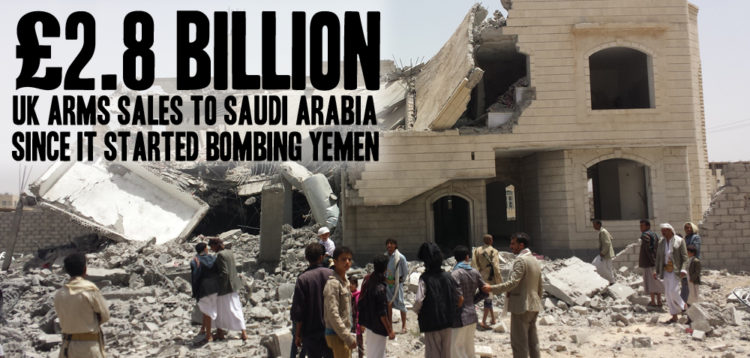By James Simons
An arms sales to Saudi Arabia has been ruled unlawful by the Court Of Appeal following a legal challenge against the UK government’s decision to allow arms sales to Saudi Arabia. The involvement of Saudi Arabia in a war with Yemen was a key consideration taken into account by the courts in arriving at their decision.
The Uk government up until now has generally considered the war in Yemen to be independent of its arms sales to Saudi Arabia, treating it as a strictly business relationship. Representatives of the government would probably argue that every country needs arms and that the issue of war is a separate matter between the parties. Today’s ruling of unlawful conduct could have knock on effects the full arms already sold which require high maintenance
Deals worth multi billion of pounds will have to be put on hold whilst the government seeks an appeal to review the ruling. Campaigners against sales of arms to Saudi Arabia cite the many lives lost and those seriously endangered as a result of a war that has left its survivors seriously impoverished.
Campaigners against Arms Trade argued that there was a clear risk of the arms being used in a serious violation of international humanitarian law. Judges called for a review of licenses but added that the would not be immediately suspended. The decision not to immediately suspend existing licenses is believed to have been connected to some of the complexities that go with contracts which could create serious problems. The court’s decision however expects the government to to begin to assess and wind down existing contracts or appeal the judgement.
International Trade Secretary Liam Fox said no new licences for export to Saudi Arabia and its coalition partners will be granted while it considers the implications of the judgement.
A spokeswoman for Prime Minister Theresa May said the government was “disappointed” and would be seeking permission to appeal against the judgement.Under UK export policy, military equipment licences should not be granted if there is a “clear risk” that weapons might be used in a “serious violation of international humanitarian law”.
VIOLATIONS
A critical point of examination by the court what the issue of violations of international law. The verdict of the court centred on the link between the arms sale and international violations.
Giving judgement at the Court of Appeal in London, Master of the Rolls Sir Terence Etherton said the government “made no concluded assessments of whether the Saudi-led coalition had committed violations of international humanitarian law in the past, during the Yemen conflict, and made no attempt to do so”. He said the government “must reconsider the matter” and estimate any future risks.Mr Fox said the government always took its export obligations very seriously.
“Today’s judgement is not about whether the government has made the right or wrong decisions about granting export licences, but concerns the rationality of the process used to reach decisions,” he added.The UK has licensed more than £4.7bn of arms exports to the Saudis since the bombing of Yemen began in March 2015.
Equipment sold to Saudi Arabia includes Typhoon and Tornado fighter jets, as well as precision-guided bombs. The BBC says the sales contribute to thousands of engineering jobs in the UK and have provided billions of pounds of revenue for the British arms trade.
Campaign Against Arms Trade spokesman Andrew Smith welcomed the judgement, saying the Saudi Arabian regime was one of the most brutal and repressive in the world – yet for decades had been the largest buyer of UK-made arms.
“No matter what atrocities it has inflicted, the Saudi regime has been able to count on the uncritical political and military support of the UK,” he said.
“The bombing has created the worst humanitarian crisis in the world.” The High Court had previously ruled that it was “rationally entitled” to conclude that the Saudi-led coalition was not deliberately targeting civilians and was investigating reported incidents. However, CAAT challenged the 2017 ruling using fresh and classified evidence from the Yemen conflict to make the decisive case at the Court of Appeal.




